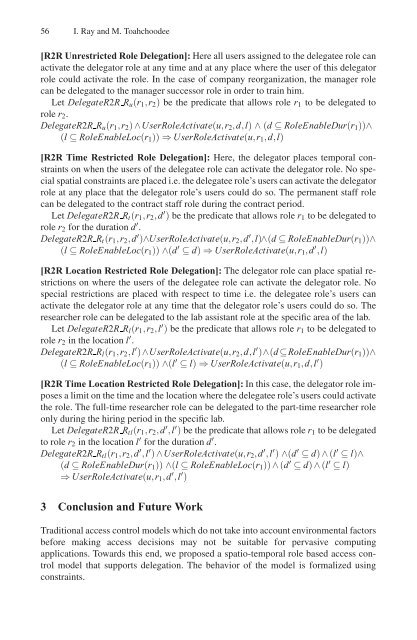Lecture Notes in Computer Science 5185
Lecture Notes in Computer Science 5185
Lecture Notes in Computer Science 5185
Create successful ePaper yourself
Turn your PDF publications into a flip-book with our unique Google optimized e-Paper software.
56 I. Ray and M. Toahchoodee<br />
[R2R Unrestricted Role Delegation]: Here all users assigned to the delegatee role can<br />
activate the delegator role at any time and at any place where the user of this delegator<br />
role could activate the role. In the case of company reorganization, the manager role<br />
can be delegated to the manager successor role <strong>in</strong> order to tra<strong>in</strong> him.<br />
Let DelegateR2R Ru(r1,r2) be the predicate that allows role r1 to be delegated to<br />
role r2.<br />
DelegateR2R Ru(r1,r2) ∧UserRoleActivate(u,r2,d,l) ∧ (d ⊆ RoleEnableDur(r1))∧<br />
(l ⊆ RoleEnableLoc(r1)) ⇒ UserRoleActivate(u,r1,d,l)<br />
[R2R Time Restricted Role Delegation]: Here, the delegator places temporal constra<strong>in</strong>ts<br />
on when the users of the delegatee role can activate the delegator role. No special<br />
spatial constra<strong>in</strong>ts are placed i.e. the delegatee role’s users can activate the delegator<br />
role at any place that the delegator role’s users could do so. The permanent staff role<br />
can be delegated to the contract staff role dur<strong>in</strong>g the contract period.<br />
Let DelegateR2R Rt(r1,r2,d ′ ) be the predicate that allows role r1 to be delegated to<br />
role r2 for the duration d ′ .<br />
DelegateR2R Rt(r1,r2,d ′ )∧UserRoleActivate(u,r2,d ′ ,l)∧(d ⊆ RoleEnableDur(r1))∧<br />
(l ⊆ RoleEnableLoc(r1)) ∧(d ′ ⊆ d) ⇒ UserRoleActivate(u,r1,d ′ ,l)<br />
[R2R Location Restricted Role Delegation]: The delegator role can place spatial restrictions<br />
on where the users of the delegatee role can activate the delegator role. No<br />
special restrictions are placed with respect to time i.e. the delegatee role’s users can<br />
activate the delegator role at any time that the delegator role’s users could do so. The<br />
researcher role can be delegated to the lab assistant role at the specific area of the lab.<br />
Let DelegateR2R Rl(r1,r2,l ′ ) be the predicate that allows role r1 to be delegated to<br />
role r2 <strong>in</strong> the location l ′ .<br />
DelegateR2R Rl(r1,r2,l ′ )∧UserRoleActivate(u,r2,d,l ′ )∧(d ⊆RoleEnableDur(r1))∧<br />
(l ⊆ RoleEnableLoc(r1)) ∧(l ′ ⊆ l) ⇒ UserRoleActivate(u,r1,d,l ′ )<br />
[R2R Time Location Restricted Role Delegation]: In this case, the delegator role imposes<br />
a limit on the time and the location where the delegatee role’s users could activate<br />
the role. The full-time researcher role can be delegated to the part-time researcher role<br />
only dur<strong>in</strong>g the hir<strong>in</strong>g period <strong>in</strong> the specific lab.<br />
Let DelegateR2R Rtl(r1,r2,d ′ ,l ′ ) be the predicate that allows role r1 to be delegated<br />
to role r2 <strong>in</strong> the location l ′ for the duration d ′ .<br />
DelegateR2R Rtl(r1,r2,d ′ ,l ′ ) ∧UserRoleActivate(u,r2,d ′ ,l ′ ) ∧(d ′ ⊆ d) ∧ (l ′ ⊆ l)∧<br />
(d ⊆ RoleEnableDur(r1)) ∧(l ⊆ RoleEnableLoc(r1)) ∧ (d ′ ⊆ d) ∧ (l ′ ⊆ l)<br />
⇒ UserRoleActivate(u,r1,d ′ ,l ′ )<br />
3 Conclusion and Future Work<br />
Traditional access control models which do not take <strong>in</strong>to account environmental factors<br />
before mak<strong>in</strong>g access decisions may not be suitable for pervasive comput<strong>in</strong>g<br />
applications. Towards this end, we proposed a spatio-temporal role based access control<br />
model that supports delegation. The behavior of the model is formalized us<strong>in</strong>g<br />
constra<strong>in</strong>ts.

















